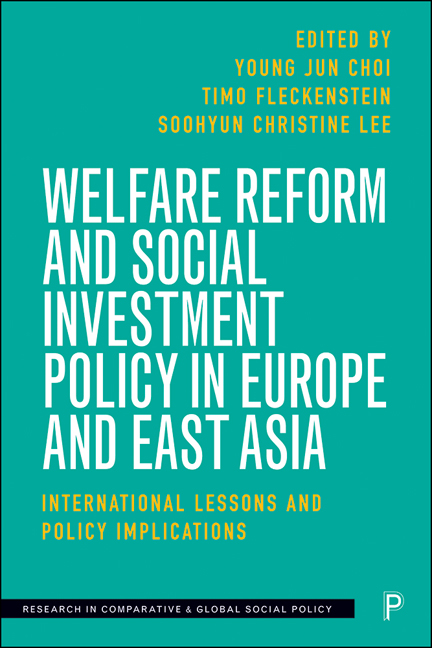Book contents
- Frontmatter
- Contents
- List of figures and tables
- Notes on contributors
- Acknowledgements
- Preface from the series editors
- 1 Introduction: social investments and welfare reform in Europe and East Asia
- 2 Work–family policy expansion and the idea of social investment: the cases of Germany, England, South Korea and Japan
- 3 Private education in South Korea: lessons for the West from past mistakes?
- 4 How do family background and shadow education affect academic performance and labour market outcomes in South Korea? Reasons for redistributive social investment
- 5 Employability, higher education and the knowledge economy
- 6 Does social investment make the labour market ‘flow’? Family policies and institutional complementarities in Italy, Spain, Japan and South Korea
- 7 The social investment approach and gender division of housework across East Asia and Europe
- 8 Employment outcomes of social investment in latecomer countries
- 9 Estimation of the human capital depreciation rate: an international comparison and policy implications in South Korea
- 10 Changing patterns of grandparenting and their implications for active ageing in England and South Korea
- 11 The governance of social investment policies in comparative perspective: long-term care in England and South Korea
- 12 Towards greater social investments and equality in Europe and East Asia: policies and politics
- Index
5 - Employability, higher education and the knowledge economy
Published online by Cambridge University Press: 21 December 2021
- Frontmatter
- Contents
- List of figures and tables
- Notes on contributors
- Acknowledgements
- Preface from the series editors
- 1 Introduction: social investments and welfare reform in Europe and East Asia
- 2 Work–family policy expansion and the idea of social investment: the cases of Germany, England, South Korea and Japan
- 3 Private education in South Korea: lessons for the West from past mistakes?
- 4 How do family background and shadow education affect academic performance and labour market outcomes in South Korea? Reasons for redistributive social investment
- 5 Employability, higher education and the knowledge economy
- 6 Does social investment make the labour market ‘flow’? Family policies and institutional complementarities in Italy, Spain, Japan and South Korea
- 7 The social investment approach and gender division of housework across East Asia and Europe
- 8 Employment outcomes of social investment in latecomer countries
- 9 Estimation of the human capital depreciation rate: an international comparison and policy implications in South Korea
- 10 Changing patterns of grandparenting and their implications for active ageing in England and South Korea
- 11 The governance of social investment policies in comparative perspective: long-term care in England and South Korea
- 12 Towards greater social investments and equality in Europe and East Asia: policies and politics
- Index
Summary
Introduction
Over the last two decades, policy-makers across advanced capitalist countries have strived to modernise their welfare states. A policy idea attracting significant interest has been that of ‘social investment’ (Morel et al, 2012; Van Kersbergen and Hemerijck, 2012; Hemerijck, 2015, 2017). Turning welfare states into social investment states means primarily thinking about social and public policies as tools to improve individuals’ skills through the life-course. Indeed, ‘better skills’ make people less vulnerable to economic shocks and technological changes, and more likely to reap the benefits of employment opportunities in knowledge-based economic sectors, such as advanced manufacturing and dynamic services (Nelson and Stephens, 2012; Gingrich and Ansell, 2015; Garritzmann et al, 2017; Kenworthy, 2017). Unsurprisingly, education policy at all levels – from early childhood education and care all the way up to lifelong learning – has been charged with the task of increasing individuals’ employability and has therefore taken centre stage within the social investment agenda (Nikolai, 2012; Gingrich and Ansell, 2015; Ansell and Gingrich, 2018). This chapter assesses the employability turn in higher education policy across advanced capitalist countries and the increasing role of higher education as the main locus of skill formation by analysing patterns of alignment between higher education systems and skills needs in knowledge-based labour markets.
The chapter focuses in particular on the inter-connections between different types of higher education systems (as commonly defined in education literature by the prevalence of vertical or horizontal differentiation), and different types of knowledge economy (with respect to the relative importance attached to advanced manufacturing or dynamic services). The focus on different higher education–knowledge economy combinations is justified on empirical grounds. Indeed, the aim of better connecting higher education systems and labour markets has been pushed across countries and it has been often aided by international organisations such as the Organisation for Economic Co-operation and Development (OECD) (Robertson, 2005; Prokou, 2008; Marginson, 2009; Capano and Piattoni, 2011). Yet, the process of alignment has not necessarily followed a common pattern across countries: research shows wide variation in the policies put in place by governments and a host of different interactions between employers, governments and the higher education sector (Ballarino, 2011; De Weert, 2011).
Similarly, the cross-national push towards a closer alignment between the labour market's skills needs and higher education provisions does not seem to have reached similar outcomes across countries.
- Type
- Chapter
- Information
- Welfare Reform and Social Investment PolicyInternational Lessons and Policy Implications, pp. 107 - 128Publisher: Bristol University PressPrint publication year: 2021

